Arabic-speaking refugees and migrants share tips and updates, including unverified footage published by border guards
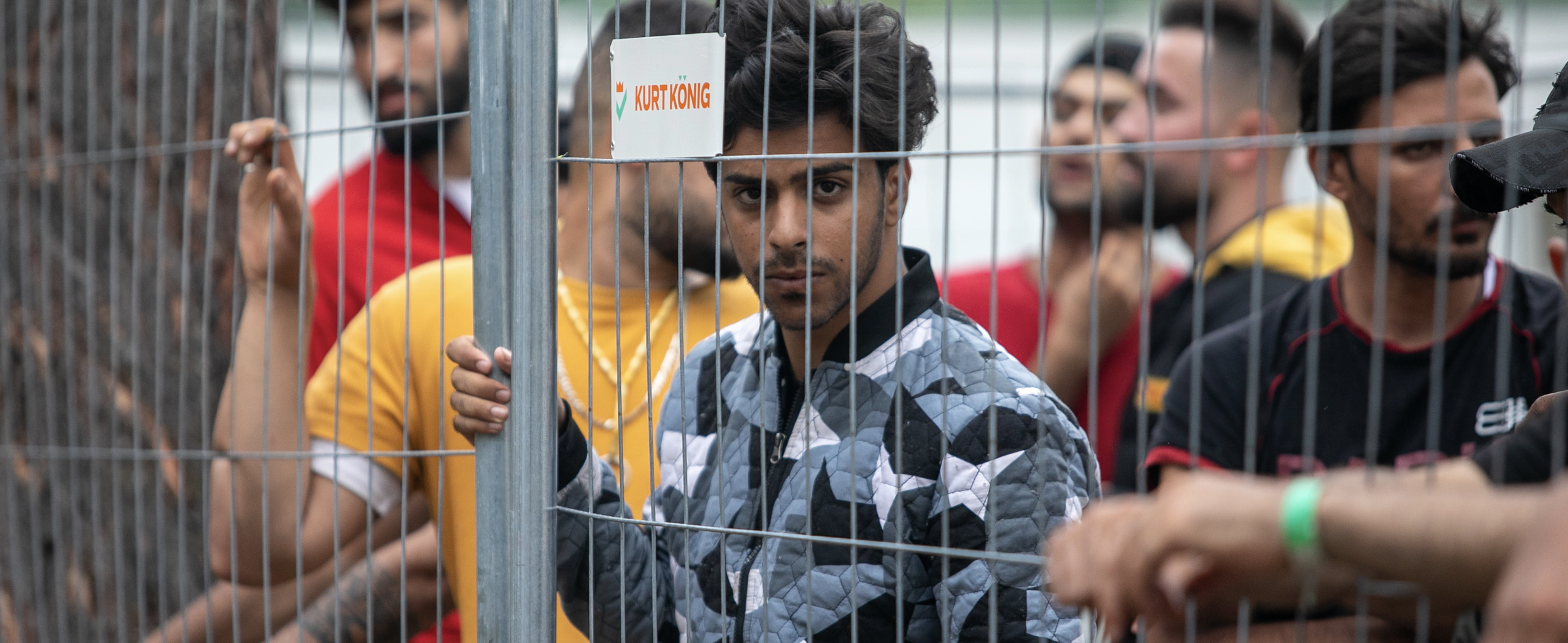
By Nika Aleksejeva
Twenty-three of the 46 Arabic-language Facebook groups focusing on migration from Belarus to the European Union were created over the course of the summer of 2021. Group members exchanged prices for Belarus visas, tips for traveling to the EU, and updates on the situation at the country’s borders with its EU-member neighbors.
The sharp rise of Facebook groups correlates with the growing number of travelers from Arab countries to Belarus, and the sharply expanding number of refugees and economic migrants — 4,100 in 2021, up from 81 in 2020 — detained by Lithuanian border guards. The DFRLab previously reported on how Belarus is exploiting refugees and economic migrants from the Middle East and North Africa, particularly ethnic Yazidis from Iraq, as a means of scoring geopolitical points. Belarus’s facilitation of the their transit to the EU has particularly affected Lithuania, where Sviatlana Tsikhanouskaya — Belarusian President Alyaksandr Lukashenka’s main political opponent — fled into exile in the aftermath of the highly disputed presidential elections in mid-2020. Open-source evidence and journalist investigations suggest that the Lukashenka regime is exploiting refugee and migrant transit through Belarus as a response to targeted sanctions imposed as a result of its own political malfeasance, including the forced landing of a commercial airplane flying over the country’s airspace in order to arrest regime critic Roman Protasevic in May 2021.
The uptick in the Arabic-language Facebook groups regarding Belarus indicates a corresponding uptick in interest by Arab-speaking refugees and economic migrants. Nevertheless, some conversations in the groups suggested they are getting disillusioned about this route as a safe and easy option. Lithuania, Poland, and Latvia have all declared emergencies on their respective borders, which allows their border guards to push them back into the neutral border zone with Belarus, where they become stuck because border guards also will not allow them back into Belarusian territory. People who end up in this no-man’s land are unable to receive vital humanitarian assistance.
Facebook groups, both public and private
Working with a fluent Arabic speaker, the DFRLab found that nearly three fifths — 27 out of 46 — of the identified Facebook groups that mentioned the word “Belarus” in Arabic (بيلاروسيا) were created in 2021, and most of those groups (23 out of 27) were created over the summer, most of which focused on migration to the EU through Belarus.
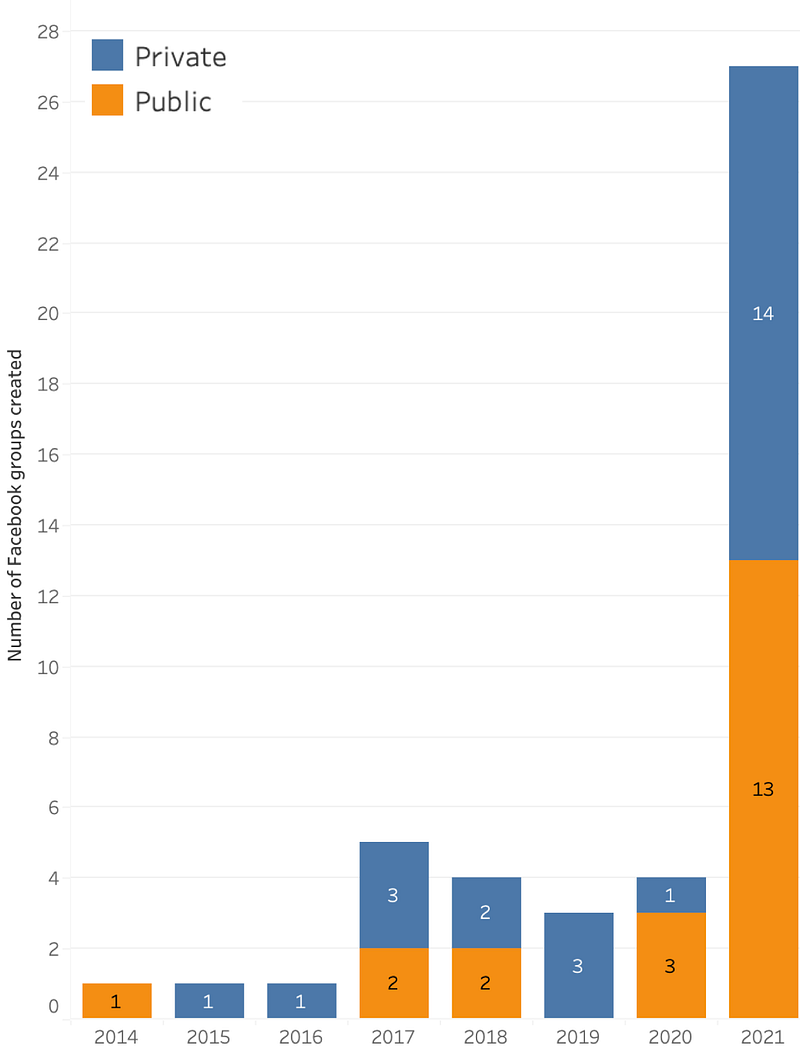
On average, private groups had more members than the public groups, likely to avoid public scrutiny by local authorities. Facebook user accounts that engaged in public group discussions were also often private and anonymized.
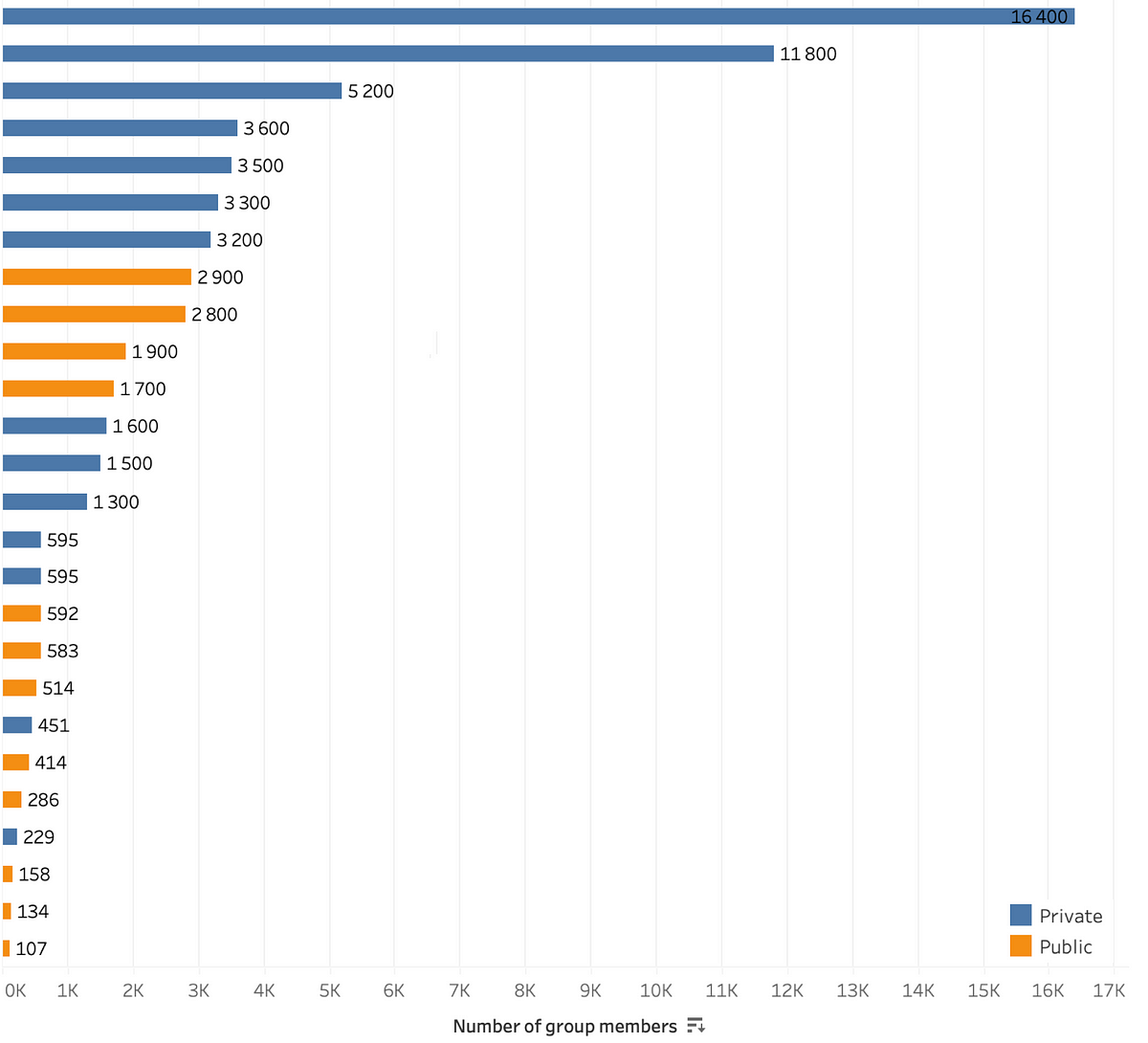
Admins of the public Facebook groups created in the summer of 2021 had sparse details about themselves on their public profiles and wrote in fluent Arabic, as assessed by the Arabic-speaker with whom the DFRLab consulted. There was no evidence that the groups were controlled by Belarusian authorities.
A marketplace for refugees — and smugglers
The DFRLab analyzed 12 public groups created in over the summer, most of which appeared to serve as a marketplace for people who wish to flee to the EU and who are seeking help from people in arranging transit.
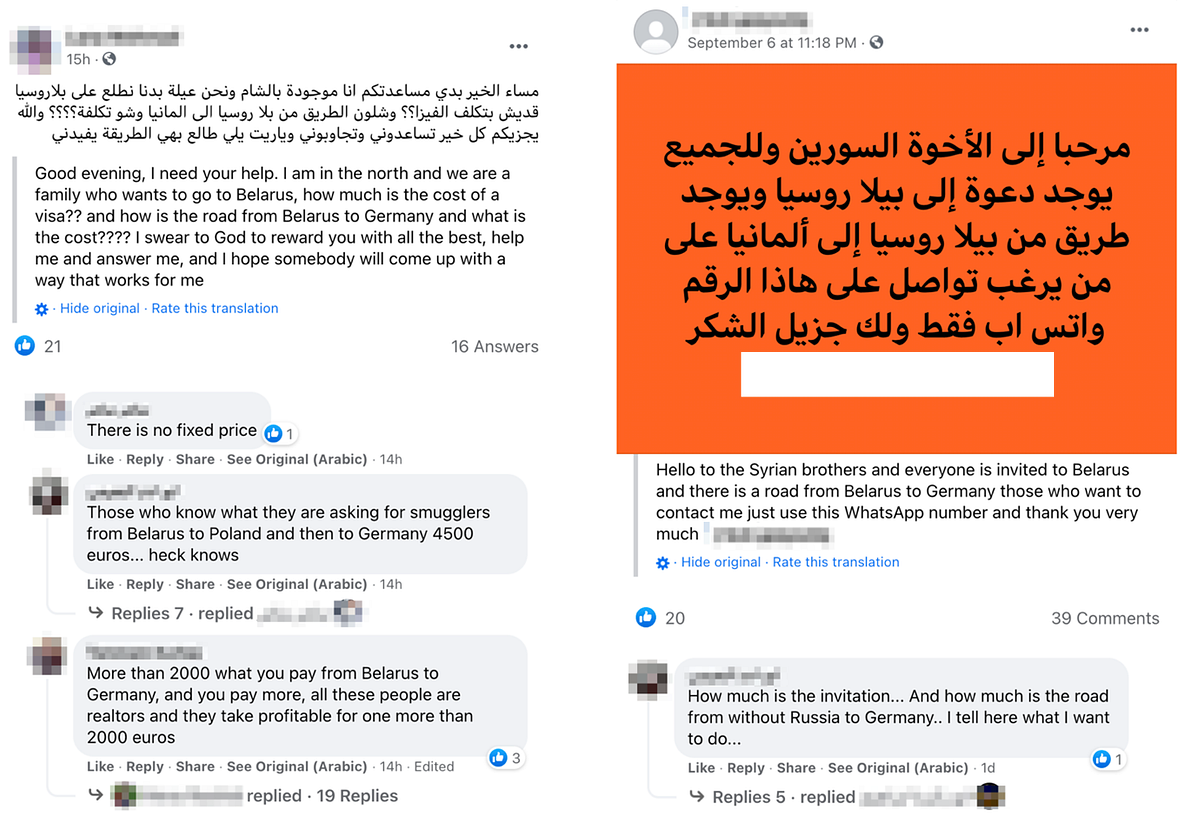
The groups sometimes served as a forum for refugees to ask for help while already on the journey too.
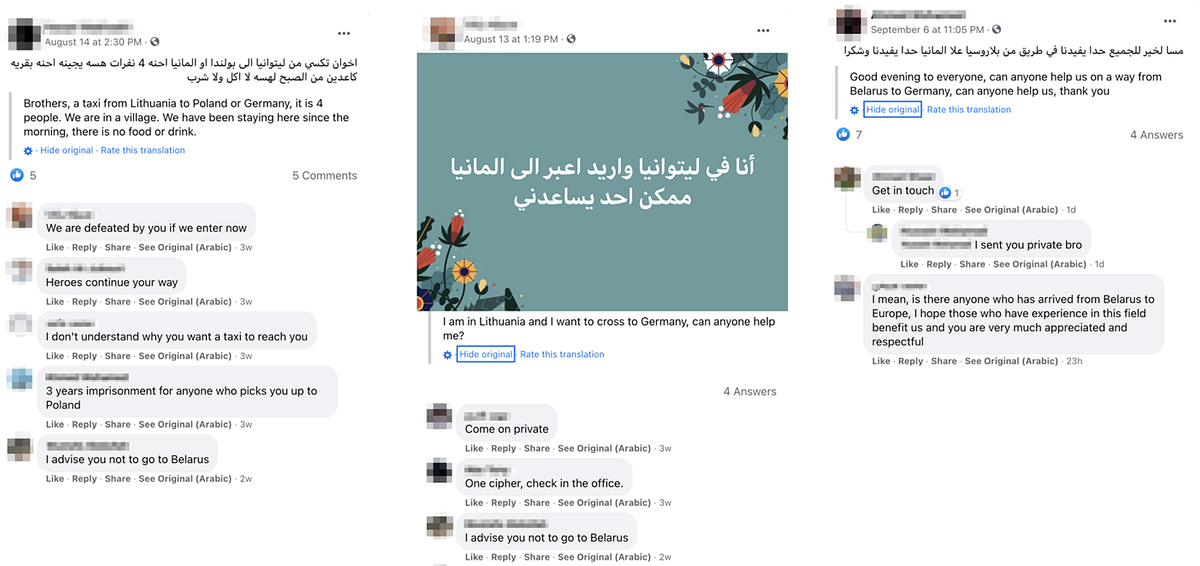
In some cases, group members characterized the migration route from Belarus to EU through Latvia, Lithuania, or Poland as dangerous and hopeless.

Sharing unreliable situation updates
There were several groups that mostly shared details of the border situation that pulled from foreign media stories. For instance, one group focusing on Iraqis traveling from Belarus to the EU shared situation updates based on content produced by Polish border guards, Lithuanian media, or Belarusian border guards.
Videos showing Polish and Lithuanian border guards mistreating undocumented refugees and economic migrants produced by the Belarusian border guards were shared to the groups quite often.
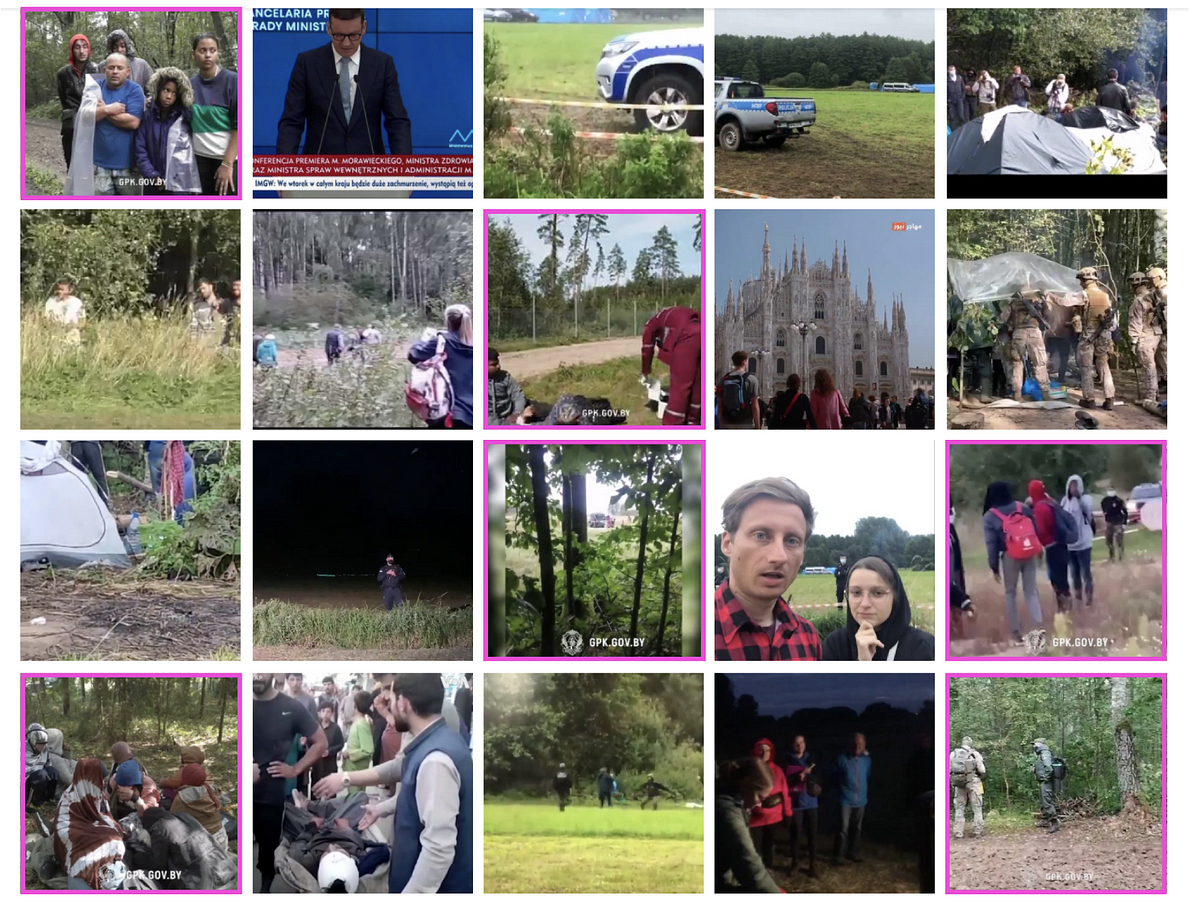
There were some reports out of Lithuania that some of the videos had been staged or exaggerated. For example, on August 10, 2021, Belarusian border guards released a video filmed by a eyewitness showing a supposedly unconscious woman being carried by Lithuanian border guards into the neutral zone between Lithuania and Belarus. In response, Lithuanian border guards released a video from CCTV camera showing how the woman stood up upon being released and, along with a number of other refugees, packs her things and heads off into nearby woods.
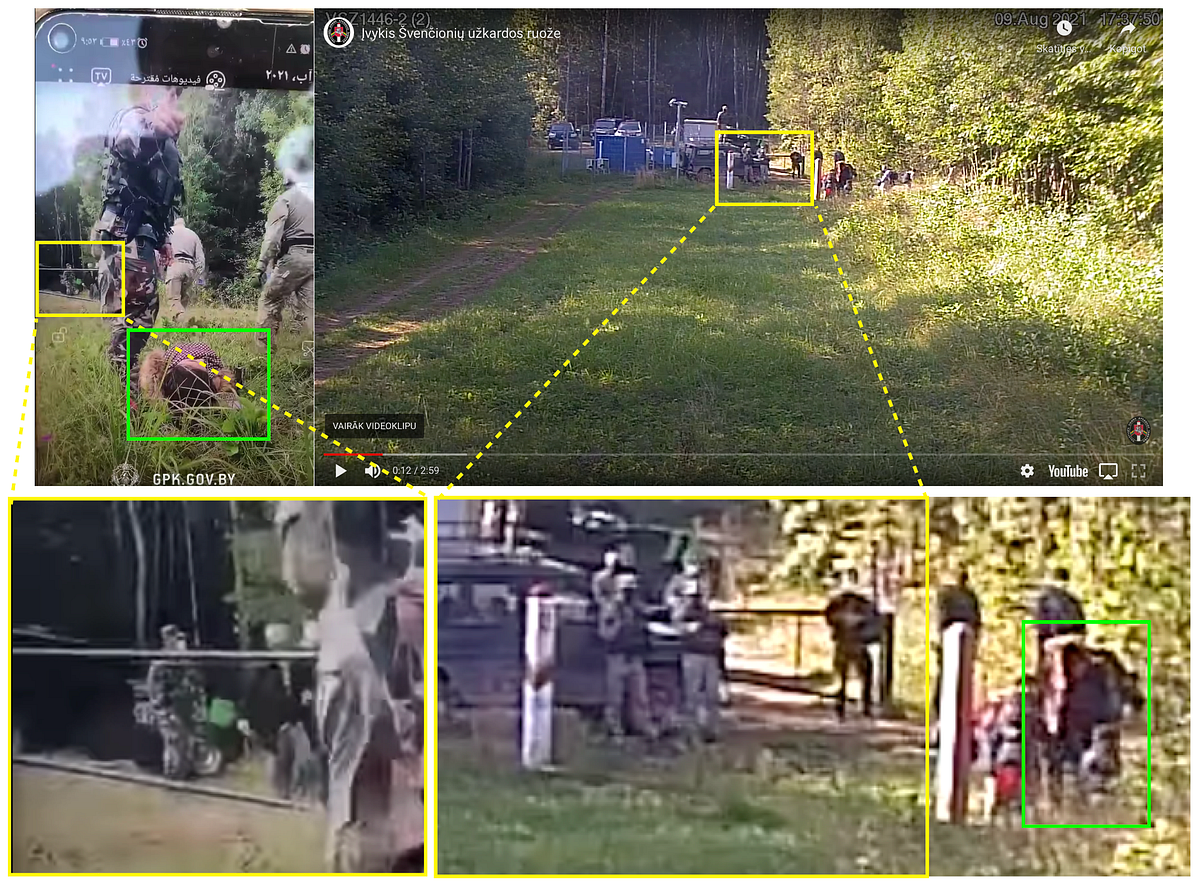
Both videos, however, are hard to verify. In the first video, it is unclear if the woman is pregnant or not, as the original Facebook post by Belarus border guards suggested. On the CCTV camera video, it is hard to identify if it is the same woman. For both videos, the location of the barrier and the vehicles match as well as the sunny weather conditions.
Similarly, on August 18, 2021, Lithuanian border guards released another video showing how Belarusian border guards staged a fake incident to claim that Lithuanian side had been violent with the refugees. One such video shows a group of four men waiting to cross the Belarus-Lithuania border, as delineated by visible poles. When Lithuanian border guards appear, the men — accompanied by Belarusian border guards — started acting as if Lithuanian border guards are attacking them, including showing alleged injuries to the Belarusian border guard who filmed the event. The DFRLab could not find an equivalent video filmed by the Belarusian border guards.
While it remains unknown how many individuals have successfully utilized these Facebook groups, evidence showed that Arab-language Facebook groups focusing on helping refugees and economic migrants reach the EU through Belarus grew at a significant rate when the Lukashenka regime started to tacitly facilitate their transit through its borders. As people fleeing often desperate circumstances seek a better life, the internet — and social media in particular — provides a valuable coordination mechanism for them. Along with this coordination, however, comes politically motivated and sometimes unverified information about their prospects to reach the destination country safely or easily.
Nika Aleksejeva is a Research Associate, Baltics, with the Digital Forensic Research Lab.
Cite this case study:
Nika Aleksejeva, “Number of Arabic Facebook groups about the Belarus-EU migration route doubles over summer,” Digital Forensic Research Lab (DFRLab), September 20, 2021, https://medium.com/dfrlab/number-of-arabic-facebook-groups-about-the-belarus-eu-migration-route-doubles-over-summer-4be0c7a64ef9.
Follow along for more in-depth analysis from our #DigitalSherlocks.

